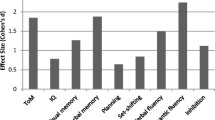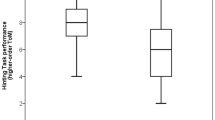Abstract
The aim of this study was to investigate theory of mind (ToM) ability in patients in remission after the first episode of schizophrenia. A ToM task which contained four pictures was given to 30 patients with schizophrenia in remission and 30 matched healthy controls. Patients with schizophrenia in remission showed statistically significant impairment in the ToM tasks. ToM impairment was not correlated with psychiatric symptoms. Thus, ToM deficit in schizophrenia may be a trait marker.
Similar content being viewed by others
References
Abdi Z, Sharma T (2004) Social cognition and its neural correlates in schizophrenia and autism. CNS Spectrum 9:335–343
Abu-Akel A (2003) A neurobiological mapping of theory. Brain Res Rev 43:29–40
Brothers L (1990) The social brain: a project for integrating primate behavior and neurophysiology in a new domain. Concepts Neurosci 1:27–51
Brüne M (2003) Theory of mind and the role of IQ in chronic disorganized schizophrenia. Shizophr Res 60:57–64
Dunbar RIM (1998) The social brain hypothesis. Evolutionary Anthropol 6:178–190
Falkai P, Tepest R, Honer WG, Dani I, Ahle G, Pffeiffer U, Vogeley K, Schulze TG, Rietschel M, Cordes J, Schonell H, Gaebel W, Kuhn KU, Maier W, Traber F, Block W, Schild HH, Schneider-Axmann T (2004) Shape changes in prefrontal, but not parieto-occipital regions: brains of schizophrenic patients come closer to a circle in coronal and sagittal view. Psychiat Res 132:261–271
Frith CD, Corcoran R (1996) Exploring ‘theory of mind’ in people with schizophrenia. Psychol Med 26:521–530
Frith CD, Frith U (1999) Interacting minds – a biological basis. Science 286:1692–1695
Herold R, Tenyi T, Lenard K, Trixler M (2002) Theory of mind deficit in people with schizophrenia during remission. Psychol Med 32:1125–1129
Inoue Y, Yamada K, Tonooka Y, Kanba S (2004) Deficiency of theory of mind in patients with remitted mood disorders. J Affect Disord 82:403–409
Janssen I, Krabbendam L, Jolles J, Os JV (2003) Alterations in theory of mind in patients with schizophrenia and non-psychotic relatives. Acta Psychiatr Scand 108:110–117
Kawasaki Y, Suzuki M, Nohara S, Hagino H, Takahashi T, Matsui Mie, Yamashita Ikiko, Chitnis XA, McGuire PK, Seto H, Kurachi M (2004) Structural brain differences in patients with schizophrenia and schizotypal disorder demonstrated by voxel-based morphometry. Eur Arch Psychiatry Clin Neurosci 254:406–414
Kee KS, Horan WP, Mintz J, Green MF (2004) Do the siblings of schizophrenia patients demonstrate affect perception deficits? Schizophr Res 67:87–94
Kelemen O, Kéri S, Must A, Benedek G, Janka Z (2004) No evidence for impaired ‘theory of mind’ in unaffected first-degree relatives of schizophrenia patients. Acta Psychiatr Scand 110:146–149
Kitamura H,Matuzawa H, Shioiri T, Someya T, Kwee IL, Nakada T (2005) Diffusion tensor analysis in chronic schizophrenia A preliminary study on a high-field (3.0T) system. Eur Arch Psychiatry Clin Neurosci (In press)
Lee KH, Farrow TFD, Spence SA, Woodruff PWR (2004) Social cognition brain networks and schizophrenia. Psychol Med 34:391–400
Overall JE, Gorham DR (1962) Brief Psychiatric Rating Scale. Psychol Rep 10:799–812
Pickup GJ, Frith CD (2001) Theory of mind impairments in schizophrenia: symptomatology, severity and specificity. Psychol Med 31:207–220
Pinkham AE, Penn DL, Perkins DO, Lieberman J (2003) Implications for the neural basis of social cognition for the study of schizophrenia. Am J Psychiat 160:815–822
Sarfati Y, Hardy-Baylë M-C (1999) How do people with schizophrenia explain the behaviour of others? A study of theory of mind and its relationship to thought and speech disorganization in schizophrenia. Psychol Med 29:613–620
Vogeley K, May M, Ritzl A, Falkai P, Zilles K, Fink GR (2004) Neural correlates of first-person perspective as one constituent of human self-consciousness. J Cog Neurosci 12:529–543
Vogeley K, Tepest R, Schneider-Axmann T, Hutte H, Zilles K, Honer WG, Falkai P (2003) Automated image analysis of disturbed cytorchitecture in Broadmann area 10 in schizophrenia. Schizophr Res 62:133–140
Author information
Authors and Affiliations
Corresponding author
Rights and permissions
About this article
Cite this article
Inoue, Y., Yamada, K., Hirano, M. et al. Impairment of theory of mind in patients in remission following first episode of schizophrenia. Eur Arch Psychiatry Clin Neurosci 256, 326–328 (2006). https://doi.org/10.1007/s00406-006-0608-z
Issue Date:
DOI: https://doi.org/10.1007/s00406-006-0608-z




